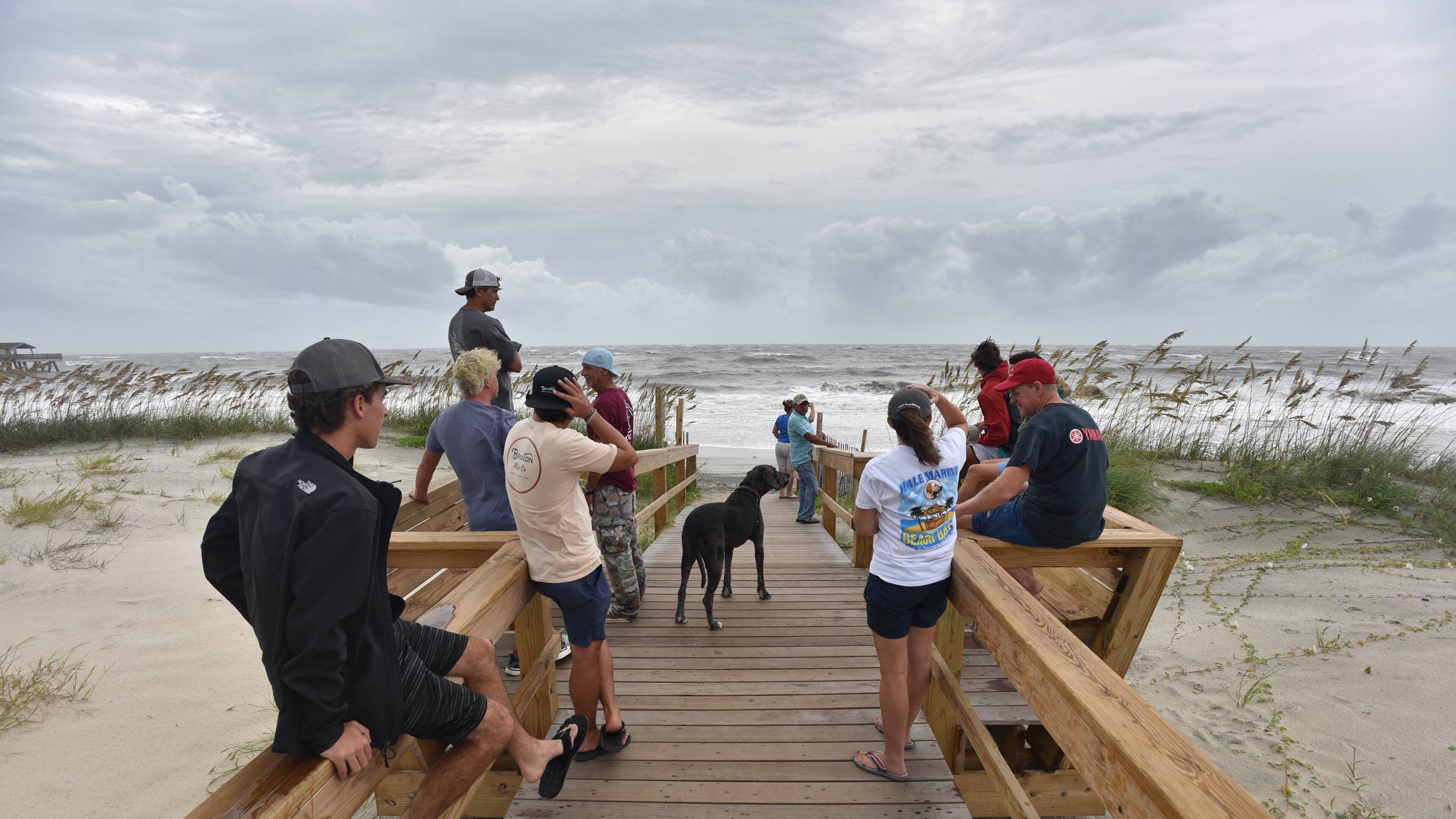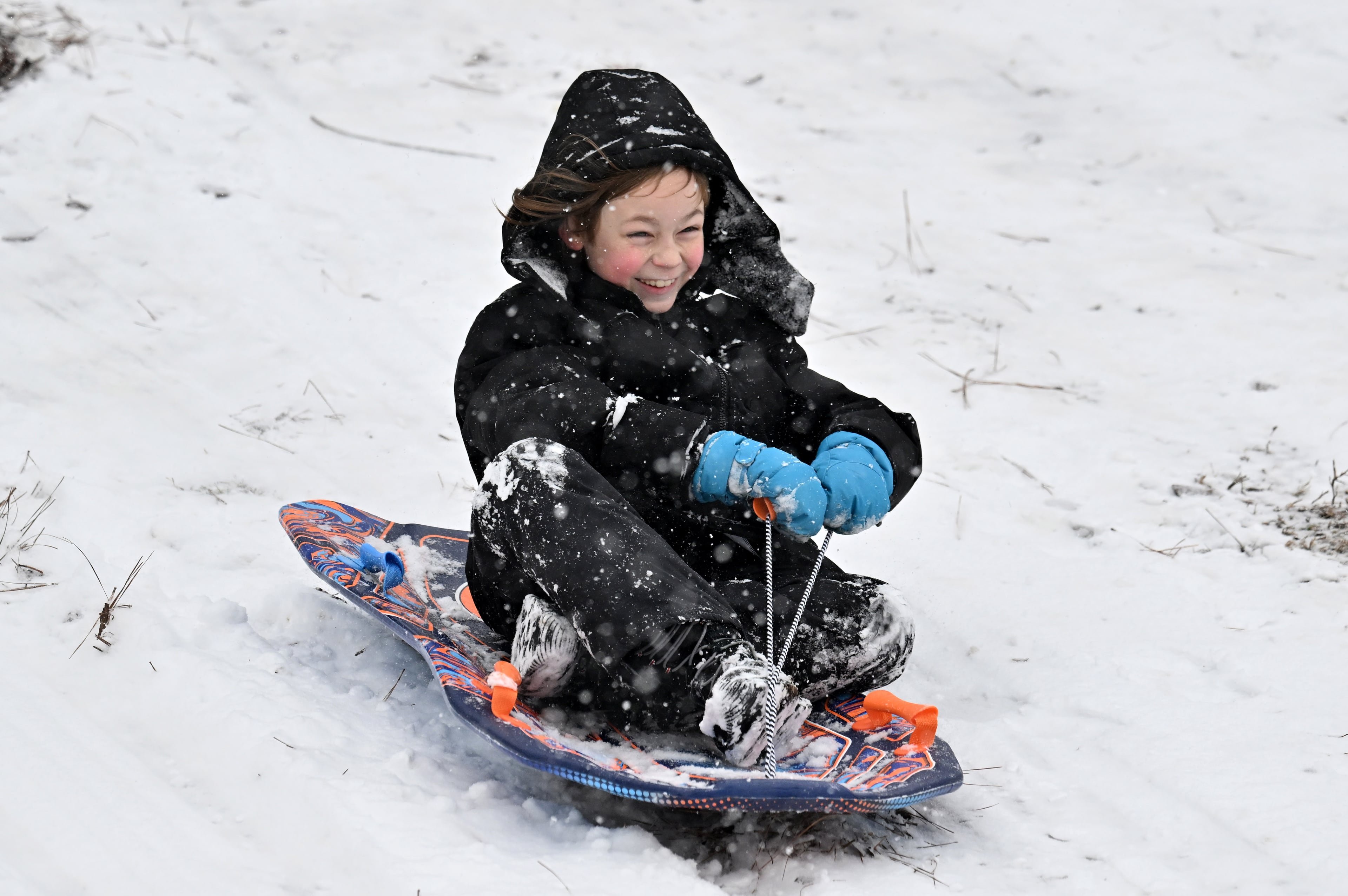Georgia awaits damage left from the path of Hurricane Dorian

After days of preparations and waiting, the creeping but still powerful Hurricane Dorian continued toward the Georgia coast late Wednesday.
The southeastern tip of the state braced for the worst. Still a Category 2 storm with winds up to 110 mph late Wednesday, Dorian was traveling at a speed of 9 mph. But even before the heart of the storm arrived, strong winds and heavy rain rolled through coastal Georgia, with the worst still to come.
And Dorian was coming. The same storm that slammed the Bahamas earlier in the week had weakened, but it still threatened the southeastern U.S. coasts. Meteorologists anticipate the Carolinas could take the brunt of Dorian later this week, including a dangerous storm surge. Until then, it is Georgia’s turn.
Wednesday afternoon on Tybee Island, Dorian delivered car-rocking winds, lashing rain and some slight flooding, which drew a steady stream of camera-toting sightseers to the beach.
Brett Lay of Tybee Island and James Simpson of Savannah snapped photos of the angry sea firing whitecaps at the public pier and wrecking the island’s man-made dunes. Lay’s home has twice been flooded by hurricanes.
“I’m hoping and praying that it doesn’t flood my house again,” said Lay, an industrial equipment salesman.
Gov. Brian Kemp and other state leaders were ahead of the storm, mandating some residents to evacuate and urging others to be prepared. By Wednesday morning, Kemp had declared a state of emergency in 21 counties.

The highway to Savannah, I-16, was re-opened Wednesday afternoon just hours after Kemp expanded a state of emergency to include nine additional counties.
Though eastbound lanes on I-16 were re-opened, it was not an invitation for the general public to go to the coast. It was to expedite access for rescuers, supplies and equipment after the hurricane passes, Kemp said.
Dorian spun off the coast of Jacksonville, Fla., on its crawl to Georgia, and winds began toppling trees and knocking out power.
“We do not want to have a death in Georgia because of the storm, because of somebody not taking it seriously,” Kemp said.
» PHOTOS: Coastal Georgians prepare for Dorian
» PHOTOS: Preparations for Hurricane Dorian in Georgia
» PHOTOS: Dorian's outer bands reach South Georgia
Many school systems and colleges in coastal Georgia, as well as Georgia Southern University, closed in anticipation of the storm. Also, some of the area’s most vulnerable residents, including newborns hospitalized in a Savannah intensive care unit, were evacuated to safer locations, including Children’s Healthcare of Atlanta.
The American Red Cross was operating dozens of shelters for those affected by evacuations. Emergency responders were on standby, including police and firefighters, along with electricity and road crews, all ready to get to work as needed.
By late Wednesday, any damage from Dorian was minimal, even following the afternoon high tide. But it wasn’t time to relax.

“That tide we were expecting to be bad at 1 p.m. was about 2 feet less than the National Weather Service anticipated, so that was good,” said Tybee Island Mayor Jason Buelterman, who added he had not received reports of major damage. “The road didn’t close. I think that is a function of the storm going a little slower than they expected.”
WAITING FOR DAYBREAK
The downtown riverfront businesses of St. Marys, the state’s most southern city on the coast, also were unscathed Wednesday afternoon. Shop owners exhaled and people in golf carts whizzed by, gawking.
“We’re really lucky,” said St. Marys Mayor John Morrissey. He spoke at about 2:30 p.m., when the water barely topped the curb during the high tide and amid Dorian’s outer bands.
Morrissey said daybreak will show how the city fared once Dorian truly passes and after the overnight high tide.
Dorian has been different because of its slow pace, and Morrissey said city and county leaders have been meeting twice a day for a week.
“We have to constantly remind ourselves that the storm is coming,” he said.
His 18,000 residents are all under mandatory evacuation. Some of those who obeyed the governor’s orders have been calling since Tuesday, asking when they could come back.
St. Marys lost a marina of boats during Hurricane Irma two years ago, when some businesses took on 2 feet of water.
New resident Jen Fabrick said, “I’m going to have a front-row seat to climate change.”
Fabrick is building a home in St. Marys, where she moved after two decades as the university architect at Emory University. She said she is building her raised home with climate change in mind.
Fabrick, 65, and friend Anne Herring, 72, laughed as they traipsed through the high-tide floodwater.
“The tide worked in our favor,” Herring said.
METRO ATLANTA ALSO BRACED
Glynn County spokesman Matthew Kent said Dorian has already caused some issues, including power outages and wind damage. When it’s safe, officials with Glynn County, along with the city of Brunswick and Jekyll Island, will assess any damage and decide when to lift the evacuation order, Kent said.
The goal, he said, is to repair any major damage to power, water and sewer systems before the evacuation is canceled.

Despite being hundreds of miles from the Georgia coast, metro Atlanta was also bracing for the effects of Dorian, including being a temporary spot for evacuees.
Hartsfield-Jackson International Airport was affected, as airlines were forced to cancel hundreds of flights, with more cancellations possible.
Delta Air Lines canceled 125 flights scheduled for Wednesday and Thursday because of airport closures and operational issues in this state, Florida and South Carolina.
Southwest Airlines, the second-largest airline in Atlanta, said it canceled nearly 600 departures throughout its network from Sunday through Friday.
Georgia was as prepared as possible, state leaders said. Kemp said his team is “battle-tested” by two previous hurricane-related evacuations of coastal Georgia since 2016.
“In this game, you don’t want to be slow to the preparations or slow to the response. We’ve learned that before,” he said.
— AJC staff writers Greg Bluestein, Kelly Yamanouchi and Chelsea Prince contributed to this article.




